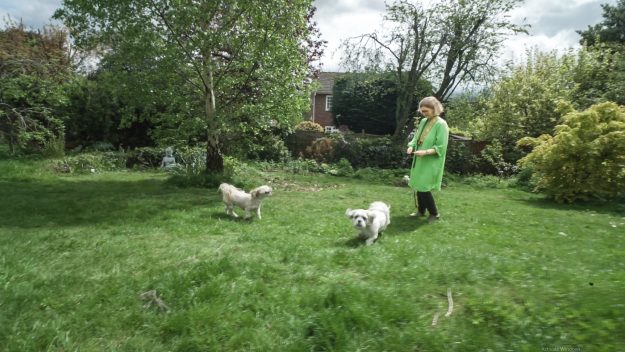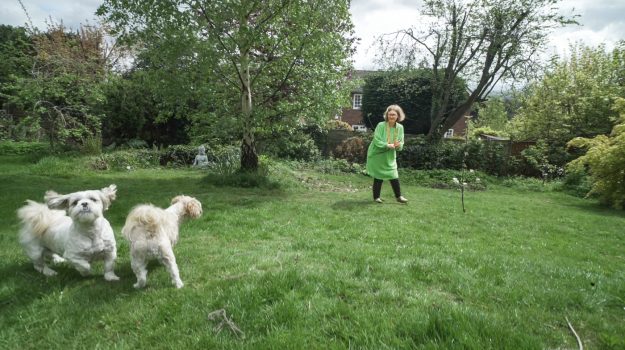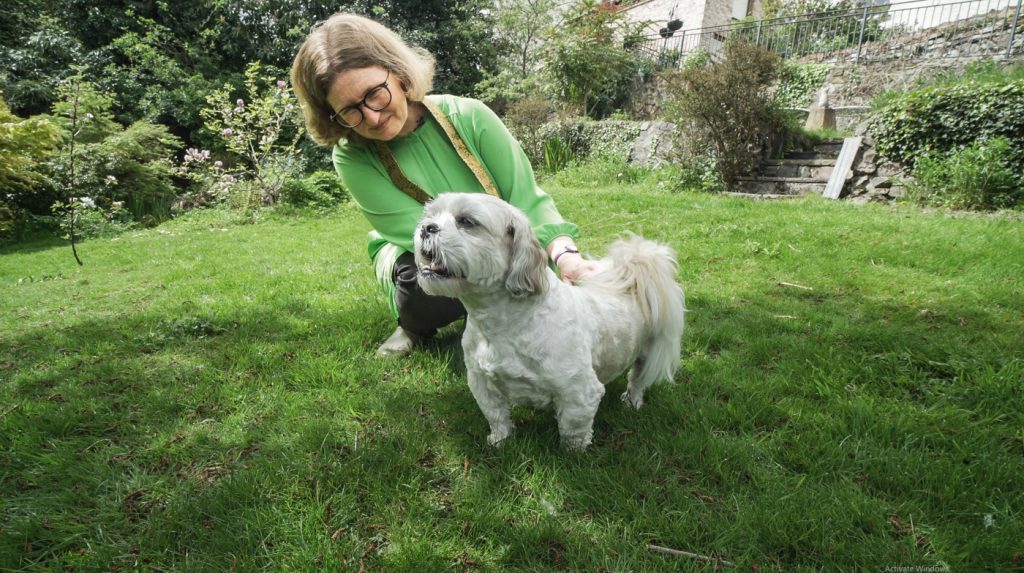Earlier this week, as part of my preparation for this dharma talk, I was looking for a quote by Shinran, the founder of the Jodo Shinshu school of Pure Land Buddhism. As I scoured my books for the perfect quote, I heard my dogs in the living room, next door, wanting to go out. So I stopped what I was doing, went to let them out, and then kept looking. Sometime later they wanted to come back in. I was not having a good time finding a quote, so I let them back in.
As I went to go back to my office, I noticed that one of our dogs, Ralph, had a certain look in his eyes. He’s a little white Shih Tzu, with sticking-out bottom teeth. When Ralph joined our family at 7 months old, we thought we’d really lucked out. He was such a placid animal, and the previous owners told us that he was very calm around cats.

And it was true, he was very calm. . . at first. But as he began to relax into his new home, he started to show the nerves that had been there all along behind the frozen exterior. He shouted at and chased our cat, shouted at birds, shouted very loudly at other dogs. He didn’t know how to interact with us or how to play because he’d never played with other dogs or people before.
When I let the dogs back into the living room, I thought I’d take the opportunity to see if I could encourage his playfulness a bit. I did my dog-play-crouch-invite—you’ve probably seen dogs doing it, going down on the carpet and widening my eyes a bit—and he just looked at me as if I was a bit crazy. I thought, “OK, I must have misread the signals,” so I turned around to go back into my office. And as I did, I heard a sound. Ralph was down on the carpet, with his paws stretched out, looking at me with excitement. Then we had a play: Ralph chased me around the living room, I chased Ralph around the living room, and we had a bit of a wrestle.
When he’d had enough, I thought, “OK, time to get back to work,” and returned to my books. As I sat back down at my books looking for this perfect quote, I realized that what I’d been doing was looking for the perfect quote to make me look clever—the quote that would lead to enlightenment in the people watching my dharma talk, or that would at least make me look like an excellent dharma teacher. So when I resumed my reading, I was quite amused that the first quote I saw was this one:
I am such that I do not know right and wrong and cannot distinguish false and true;
I lack even small love and small compassion,
And yet, for fame and profit, enjoy teaching others.
I really cherish this quote, and especially the last line, because it speaks so directly to the parts of me that also bring those mixed agendas to dharma teaching, the parts of me that yearn for fame and profit. I realized that I was in such a tangle preparing for this talk only because I was coming entirely from a place of needing to be impressive.
What I love about Pure Land Buddhism is that it’s realistic about our fallible nature as human beings. There’s a word for this in Pure Land Buddhism—bombu, or “foolish beings of wayward passion.” When I hear it, I always imagine a cork bobbing around on the waves of greed and hate and delusion, that we’re often driven by forces that we’re hardly aware of.
Shinran saw this. Shinran really experienced this in his own life. He yearned to be a pure spiritual being. He spent many years studying texts and learning from other teachers, but he just kept coming up against this fact of his limitedness—this fact of being flawed, of wanting to be good and not managing it. So when I read that quote, his radical honesty about himself jolted me out of my own ego trance. Ralph’s wanting me to play with him helped too, of course. Shinran and Ralph together took me out of that preoccupation with propping myself up or being seen a certain way.
Everything around us has the opportunity and the capacity to appear in the form of the Buddha.
And then I found a second quote. This is Shinran speaking about Amida Buddha, also known as Amitabha, or the Buddha of Infinite Light—the Buddha that we’re in relationship with as Pure Land Buddhists. In our temple, we often say that Amida accepts us just as we are, that they are the “Buddha of All-Acceptance.” When Shinran speaks about Amida, I love the feeling that I get from his words, which matches my own feeling about my real and loving relationship with Amida.
Here’s the second quote:
The light of compassion illumines us
from afar;
Those beings it reaches, it is taught,
Attain the joy of dharma,
So take refuge in Amida, the great
consolation.
And as I live in that quote, tears come to my eyes because it becomes real inside me. I have been lucky enough to have a taste of what Shinran is speaking about. I particularly love that word “consolation.” I don’t think it’s often used in Buddhist circles. But for me, spiritual life is about finding consolation. It’s about finding that steady place where we can be soothed and where we feel like we’re accepted in order to go forth and do the things we need to do in the world and face the things we need to face.
T
hat afternoon’s experience was one that I often have when I encounter Pure Land teachings. It’s a three-stage process of coming back to—I was going to say coming back to myself, but it’s the opposite of that, it’s coming back to the Buddha. The first bit is getting into a tangle. When I was searching for the perfect quote, I was getting more and more into a tangle waiting for something that would bring me the solution to my nervousness or to my greed for fame. That’s often a very unconscious thing, being in the tangle. We don’t really know that we’re in the tangle. There might be some little signs, but we’re looking through the eyes of the tangle.
The second bit is waking up. Finding that first quote from Shinran acted in that way for me. In that moment, I awoke to my foolish nature—that sinking feeling where we suddenly see how ridiculous we are. Acknowledging our foolishness can be a very jarring experience, but it shouldn’t feel shameful. It’s not a feeling of “I’m a terrible person.” It can even be funny! I like to imagine a wry smile on the Buddha’s face. When I get caught up in ego-driven thoughts about looking or seeming a certain way, that smile says, “Oh, yeah, she’s doing that thing again, bless her.”
The last stage is opportunity. Once we have that moment of recognizing our layers of self-protection, we have the opportunity to remember that while we are limited beings, we have access to unlimited love. As Pure Land Buddhists we form a connection with Amitabha Buddha, and this opening is where it becomes possible for Amitabha’s light to enter us. It’s a grace. It’s unasked for. It’s unearned, and it is wonderful. It is a wonderful thing to get a taste of, and when I do, I take refuge in Amida, and I feel the great consolation.
Then, maybe thirty seconds later, or maybe five minutes if I’m lucky, I’m back in the tangle again. That’s how it is to be alive.
The good news is there’s often a little dog that will come and ask you to play, or there’s a teacher who acknowledges their own foolishness, or there’s a blackbird singing, or a piece of toast popping up from the toaster. Everything around us has the opportunity and the capacity to appear in the form of the Buddha. The Buddha appears in many different forms. And Ralph was bringing me the Buddha at that moment.

Adapted from Satya Robyn’s dharma talk The Consolation of Amitabha Buddha, published by Tricycle in August 2023. Visit tricycle.org/dharmatalks for more.
Thank you for subscribing to Tricycle! As a nonprofit, we depend on readers like you to keep Buddhist teachings and practices widely available.
